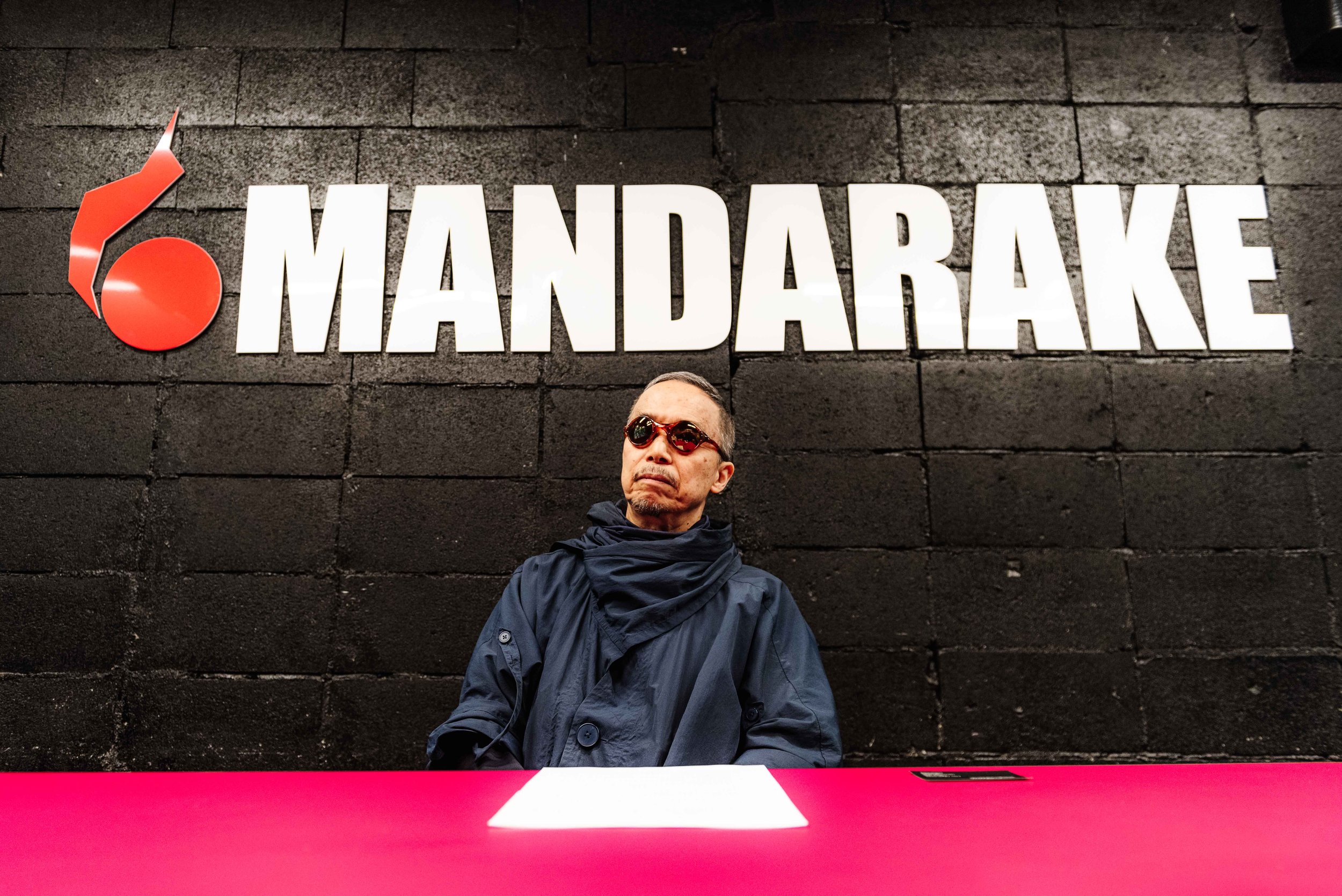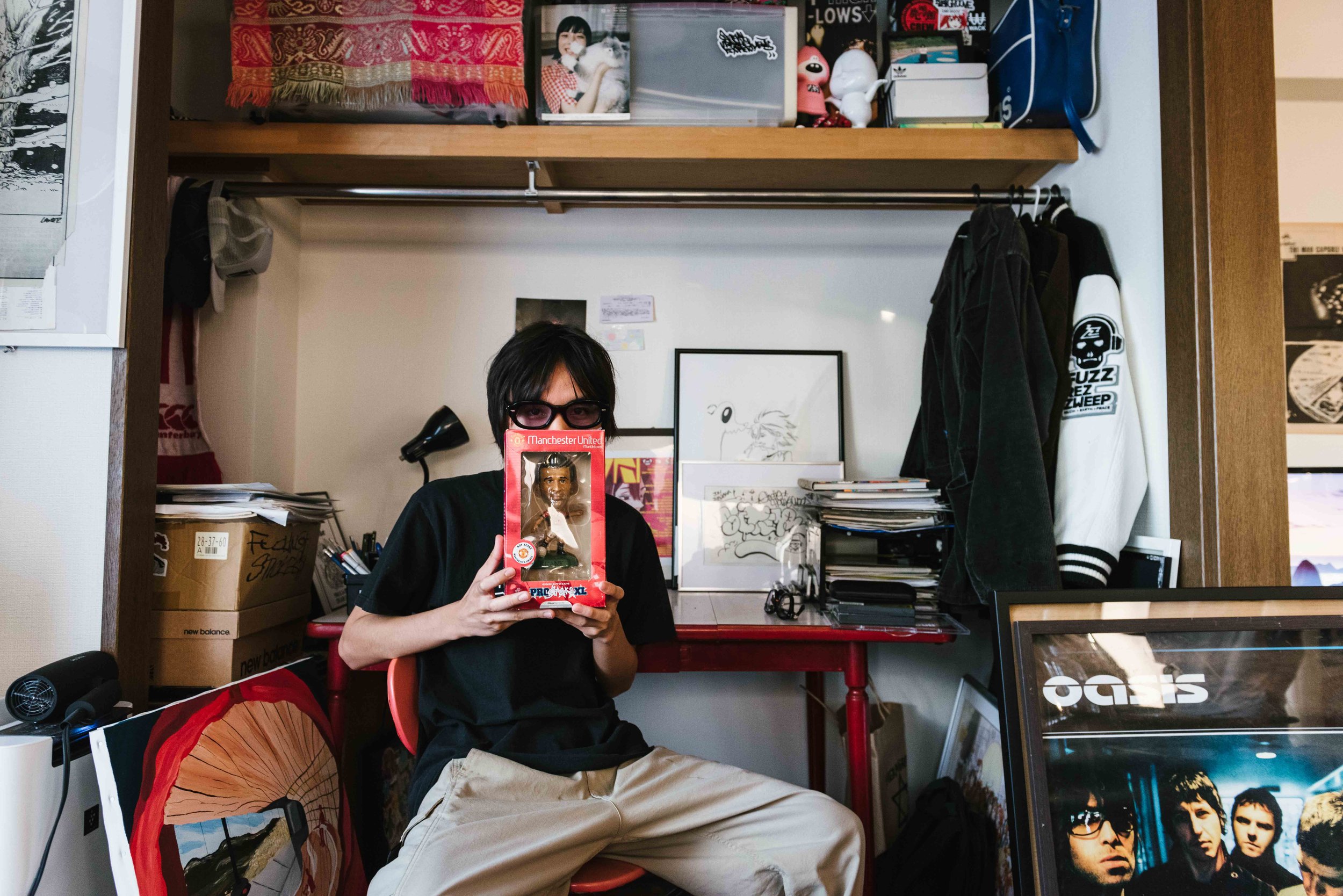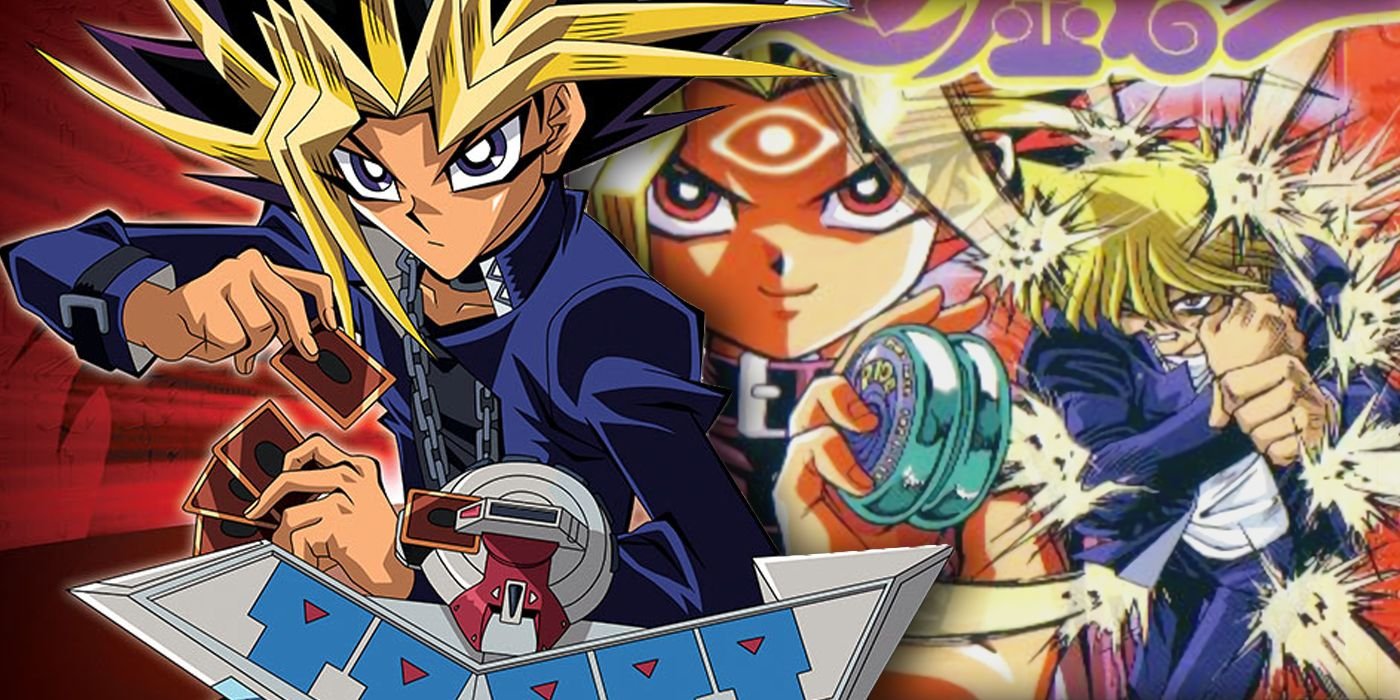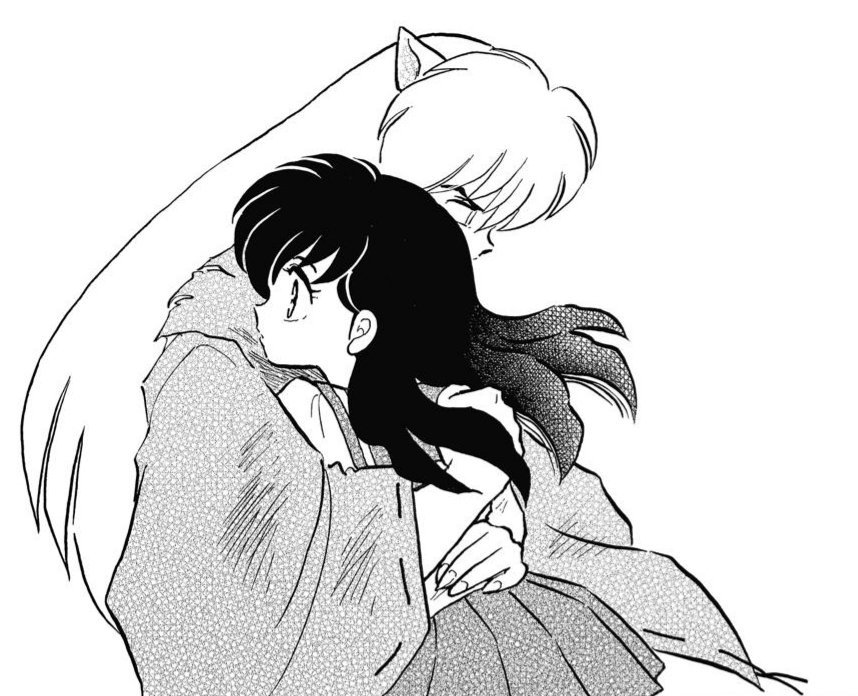The God of Subculture - Masuzo Furukawa, Founder of Mandarake

For those of you who don’t know, the word “Sabukaru” is the Japanese shortened term for “subculture”.
That’s what we try and talk about on our platform, which naturally makes it our magazine name. But when you look at Japan as a whole, there is one store, one place in particular that is known as the “Sanctuary of Sabukaru”. A place that has such a rich history that roots deeply in subcultures and otaku cultures, a place so real and raw. In fact, one of the places that we love so much, we find ourselves there multiple times a month. This place is MANDARAKE, the legendary shop that has almost anything hobby-related that you can think of.
Founded in 1980, MANDARAKE was originally a mere 7m² second-hand book store in the Nakano Broadway complex. After officially going corporate in 1987 and expanding in the years following, MANDARAKE is today the largest second-hand comics retailer in the world. But why did MANDARAKE get to where it is? How did it go from a tiny bookstore to a global corporation with revenues of 10 billion yen a year? There is no other way to find out than to talk to the man who started it all, Masuzo Furukawa.
Born in 1950 in the Shiga prefecture, Furukawa’s life is unlike the ordinary. Before anything, Furukawa started to create manga, when he was influenced by Shotaro Ishinomori in middle school. Since then, he worked as an assistant for the legendary mangaka Shigeru Mizuki of “GeGeGe no Kitarō”, submitted his own manga to the iconic manga magazine GARO, and ran a different second-hand book store by the name of Yutoriya, all before starting the MANDARAKE legacy.
After the MANDARAKE franchise started, is when his life really took off and they became “The Rulers of Time”. Back when MANDARAKE opened, there was no market for second-hand manga, and Furukawa & his store are credited as basically creating the market, setting price points for vintage books & comics.
Sabukaru had the extremely rare opportunity to sit down and talk with one of the most important figures who helped shape the manga & otaku scene, Masuzo Furukawa himself. From selling dinosaur fossil replicas to Hayao Miyazaki, being in “Beat” Takeshi Kitano’s hilarious & legendary show “Takeshi’s Castle” [and making it to the final stage], to words about today’s anime & otaku culture, check out what Furukawa had to say in our exclusive interview below.
Thank you for taking the time to sit down with us today. Can you please introduce yourself to the Sabukaru network?
I’m Furukawa, current president of MANDARAKE, Inc.
Humble beginnings that started in 1980 as a small second-hand bookstore, did you ever imagine becoming this big today?
Not at all, actually. To be honest, I have mixed feelings about it. I really didn’t plan on making it this big, but as more people joined the company, I was left with no choice but to grow.
What were the 7 years like between first opening Mandarake and becoming a public company?
It really was a period of exponential growth.
Surely you had some plans for growing the business?
Actually, it was the opposite. I was keeping it from becoming too big.
So, it really grew naturally?
Yup.
What are some of the values and concepts that you’ve kept close to your heart since opening the shop?
There are two things. Firstly, I wanted to cherish the Japanese culture that started with manga, anime, and vintage toys. It’s a unique culture even compared to those around the globe, so I wanted to safeguard them, and preserve them.
The other reason comes down to our customer base. Most if not all of our customers are what people call otakus, and depending on who you ask, they can be castaways from society. So, I wanted to build a safe space for them; a place where they can truly be themselves, without being shy or anything.
Incredible. There are a handful of different stores under the Mandarake umbrella, but do you have any particular favorites?
To be honest, no. But if I have to give you one, it has to be the very first store. It used to be in the corner of the second floor of this building, but it was so small, maybe about half the size of this room we’re in. I used to manage the store while writing manga since it was difficult making a living out of just writing, but that was sort of my ideal life back then. Once I started buying second-hand books to sell, my store started to rack in money, so I started to buy what I personally liked, and the rest is history. I also quit writing manga, but to be quite honest, those were some of the most memorable years in my life.
Interesting. In the decades you’ve been running the business, are there any items that you were particularly fond of?
It has to be Fujiko Fujio’s debut book “Utopia”. We have this huge safe, and we keep some of our rarest items in there. There are a lot of things we haven’t shown yet, but “Utopia” is also in there.
What are some of the most expensive items you’ve sold?
If my memory serves right, Hayao Miyazaki's signed Nausicaa paper for over JPY 30,000,000. I believe that was from 3~4 years ago.
Are the items in the safe all on sale?
Currently, most of them are not. The items in the vault are so valuable, that it would be problematic for the company to have sold them all at once. I'm sure we'll have to sell them at some point, but I just want to keep them for a bit longer.
We’re actually big fans of Mandarake, we come here as often as every week.
If that’s the case I think you guys would get along with the current CEO here. He’s a huge otaku, as well [laughs].
We’re quite curious about how you came up with your catchphrase “Rulers of Time.” Can you explain the story behind it?
We actually have an online manga series that explains this on our website but simply put, it has a lot to do with how we handle a lot of vintage toys and memorabilia. I personally think the memories of playing with toys and reading manga growing up are what we humans distinguish as time. Although the hand on the clock may also tell us the time, the emotionally charged thoughts we associate with the things we grow up with have a way of telling time, as well. So, as a company that handles a lot of these things, I feel as though we have the ability to breathe life back into them.
As we turn our backs on our childhood and assimilate into society, we tend to forget the excitement we felt as children first experiencing shows like Ultraman. So, I wanted to create a space where people can be reminded of those days and possibly relive some of those experiences. That's the brief explanation of the catchphrase and sort of why we do what we do here.
Amazing. We also understand that there used to be a store called Yutoriya before Mandarake. Can you briefly touch on the history of the two stores?
There was indeed a store called Yutoriya before, but we were dead broke. I couldn’t even pay rent, so I took a part-time job to keep the store open. Although it wasn't a store I started, actually, rather everyone who previously worked there quit one by one before I was the only one left [laughs]. I didn't make money at all, but being a store owner was a great experience.
So, without Yutoriya, Mandarake wouldn’t have existed?
Precisely. Yutoriya was located in a street where there was barely any foot traffic in Chofu, so we literally had zero customers on rainy days. It was near a train station, but we were in a spot where people hardly even noticed the existence of the store. So, we had to close the shop, but I always thought the very concept was interesting enough to gather people and decided to open MANDARAKE where enough people could actually see the store.
We’ve read your latest manga series at Sabukaru, and couldn’t help but wonder what made you want to be a mangaka in the first place.
There used to be a magazine called COM that Osamu Tezuka edited, and I submitted one of my works, only to find out that they actually liked my work to have it published. The magazine isn't around anymore, but it used to be one of the most popular magazines from the 70s to the 80s, where all the top-notch manga artists submitted their works to jump-start their careers. I was ecstatic to have one of my stories published there, so I thought I would be able to make it as a manga artist, but once I moved to Tokyo, nothing really happened. I still had to make a living, and that's sort of how I ended up starting MANDARAKE [laughs].
So, if you had made it as a manga artist, Mandarake wouldn’t have existed?
I suppose.
We also understand that you used to work as an assistant for Shigeru Mizuki’s production studio. How did you end up landing that job?
I was able to write stories working for GARO, but I didn’t get paid enough to make a living, so Mr. Nagai who was the editor-in-chief at the time introduced me to Mr. Mizuki. So, that’s sort of how I started working for him as an assistant.
How would you explain the importance of manga to people outside of Japan?
Actually, I think it might be even more popular abroad than it is in Japan. A series that may have been released yesterday could be watched by everyone across the globe by tomorrow.
What are some of the most influential pieces of work that you’ve read?
I think it comes down to works by Shigeru Mizuki, Sanpei Shirato, and Yoshiharu Tsuge. Mr. Mizuki’s “Kappa no Sanpei,” Mr. Tsuge’s “Akai Hana,” and Mr. Shirato’s “Ninja Bugeichō” are some of my favorite pieces that I hold close to my heart.
They might be a tad out of our age range…
I’m sure [laughs].
What was it like being part of the legendary Shigeru Mizuki’s team?
It was like being in heaven. Mr. Mizuki was a very nice person who never got mad [laughs]. I was so bad at drawing that I couldn't help but feel sorry for the whole team, but they let me draw the backgrounds. Mr. Mizuki was a genius, but all the other assistants were also really good at what they did, so I suppose that's one sore spot of my entire experience there.
How long were you there for?
I was there for a very short time. The people there were very nice to me, so I felt comfortable being there, but my lack of technical skill as an assistant among such a highly skilled working workforce made me uncomfortable and even pitiful, so I decided to quit. Mr. Mizuki stopped me from quitting multiple times, but I decided to leave the studio anyway.
So, you started to write your own manga after quitting Shigeru Mizuki’s production studio?
Actually, I was writing my own manga long before that gig.
Unrelated to Mandarake, but we at Sabukaru love “Takeshi’s Castle”. We couldn’t not ask you about your experience as a contestant.
It’s amazing you know about that [laughs]. I joined as a contestant 3~4 times in total, but I was only able to go to the final zone once. I never got to win though.
That’s amazing that you made it to the final zone. Why did you decide to join the show in the first place?
I just thought it might be fun. And sure enough, it was a fun experience, and I really liked the challenge.
The recent surge in popularity for everything anime and manga around the world has paved a way for these subcultures to be recognized as mainstream culture. How do you feel about this phenomenon we’re seeing today?
I have two things in mind. First and foremost, I think otaku culture goes beyond anime and manga and even ventures into academic disciplines such as physics and fine art. In giving perspective, more often than not, people on the cutting edge of anything at all are otakus. Einstein and Van Gogh are good examples in that they were never always as highly regarded as they are now. They were once castaways from society but stuck with what they believed in and slowly but surely got accepted by society.
People often stereotype otakus and associate them with certain looks and ideas, but I personally believe the word otaku is simply one way to describe people that have the willpower to believe in whatever they think is right or cool for them. Otaku culture is a mindset that allows people to believe in whatever thing they want to believe in.
In essence, otakus have always been the ones that created subcultures, and otakus exist beyond a handful of subcultures.
How do you see Mandarake grow from here?
I’m preparing to leave the company in the near future, so everything is up to our CEO, who is 45 right now. But looking back to the long road that took us here, while there are plenty of people who supported us through the journey, there were equally as many people that weren’t very supportive. I personally didn’t get bothered by them, but our CEO is somewhat socially awkward, so I'm a bit worried for him, to be honest. So, I'm planning on strengthening our security around the stores. That's about it for immediate plans.
We’ve read your latest manga series, and to be quite honest, it was a challenging read, and it seems that each one of us had very different takes by the end of the read. Can you tell us more about the manga itself?
It’s definitely a difficult read. It’s a series that I’ve been trying to finish for so long now, but couldn’t until now since I was busy managing the company. Now that I have more time to write the manga, I’ve been working on it day and night, and I think I’ve managed to write 2,000~3,000 pages worth of content.
What kind of person/audience did you want to have read it by?
I’m not sure, actually. As you mentioned, it is quite a difficult read, but it’s also a piece of work I want to leave behind.
So, is it more of a passion project than a piece of work with a central message behind it?
I suppose. This is sort of the reason why I didn’t make it as a manga artist in the first place. I wrote pieces that I wanted to make, rather than pieces that are consumable [laughs].
Some pieces of work don’t experience success until 10-20 years down the line. Do these pieces of work have anything in common?
I always tell my employees it’s often the pieces of work that tell stories of universal values are often the ones that live long after their initial releases.
Touted as the “Sanctuary of Sabukaru”, what does the word subculture mean to you?
This is similar to the previous answer, but I personally believe academic topics are also subcultures. Anything that’s stuck around until now has to have started as a small subculture. I'm sure some cultures can amass a big following right off the bat, but I think most if not all cases fall flat. You can have all the backing from the government and receive funds from the Cool Japan policy, but I don't think anything interesting will come out of that. For myself and many of my contemporaries, the joy and imagination of being able to create something with pen and paper were enough to get us going, and I think it's the freedom of being able to do as one desires that builds subcultures. No amount of money from the authorities can create subcultures without the spirit and imagination of people.
Although a for-profit organization, it feels as though people get more than what they pay out of Mandarake. A peculiar phenomenon seen rarely elsewhere, what do you think about how much joy you bring to your customers?
There’s nothing more I can hope for but to share the joy with my customers.
Somewhat of an imaginative question, but given that you had to switch lives with one of your customers, which store would you like to visit first?
Maybe Henya.
We ask this question to all of our interviewees, but do you have any restaurant recommendations?
I don’t really eat out as much anymore, so I can’t give you any recommendations. There weren’t a lot of places to eat out around here to begin with, so we actually decided to create a canteen inside our building. Amazingly, our canteen has been involved in recreating one of the most beloved tsuke soba meals around here. There used to be a famous spot called Eiraku near here, but the owner passed away and had to close the shop. No one came close to recreating their tsuke soba meal, but people at our canteen studied it, and managed to do the impossible.
MANDARAKE’s Eiraku-recreation tsuke soba meal
So, not only do you preserve otaku culture, but also have been protecting food culture around here?
I guess so [laughs].
Under the Mandarake umbrella, are there any stores that may not be as popular as others that you’d like to recommend for people to visit?
To be honest, I can’t recommend one store over the other since I love them all the same, but Kaiba could be interesting since we handle a lot of obscure subculture artifacts there.
All the Mandarake stores in Nakano Broadway
Although you might’ve given us a peek earlier, can you give us a brief rundown of what a day in your life looks like?
I wake up around 2:00~3:00 am in the morning and usually write manga until 11:00 pm in the evening. I sometimes hold lectures for the company, but that usually only lasts about 2~3 hours, so I'm really writing manga for the most part.
It’s hard not to ask since we really like your Outfit today: Can you describe your fashion style?
I don’t really pay attention to fashion, but I made the caot I’m wearing today. I made it because I wanted to wear something that looked like this, but could not find it on the market - nothing more nothing less.
Do you have hobbies outside of anything related to things you handle in Mandarake?
I actually have a lot of interests. I love guitars and vintage cars, but sadly, they aren’t something we sell at MANDARAKE, so I keep it to myself. I used to own this old Mercedes-Benz, and I remember taking it for a ride on the highway, but the brakes failed on me for some reason, so I had to slow the car down by scraping it on the guard rails [laughs].
We also used to sell fossils at the store, and if you ever visit our Umeda branch, you’ll be greeted with a life-sized mammoth fossil replica. Funny enough, Hayao Miyazaki once came into our store to buy replicas of a T. rex head fossil and a Triceratops. We used to have this Chevrolet pickup truck from the 50s that we painted in red, and I delivered the fossil replicas to their Musashino production studio. I got to set the fossil replicas up on their rooftop, but I clearly remember Mr. Miyazaki’s impression when I showed up in front of their production studio with our red Chevrolet pickup with his fossil replicas on the back.
What’s in store for Mandarake’s future?
I built this company so that otakus can feel comfortable being around here, so I hope to keep it that way. It’s always been a safe space for otakus, and I hope it can become a starting point for them to assimilate into the real world, as well.
Lastly, can you leave a message to the otakus out there?
I don’t know if I’ll ever see it happen, but I hope to see the day when otakus can feel comfortable being part of society. That’s all I’ve wished for, and continue to work toward making it happen.
Thank you so much for your time today!
Interview by Casey Omori and Adrian Bianco
Text by Casey Omori
Images by Natsuki Ludwig









